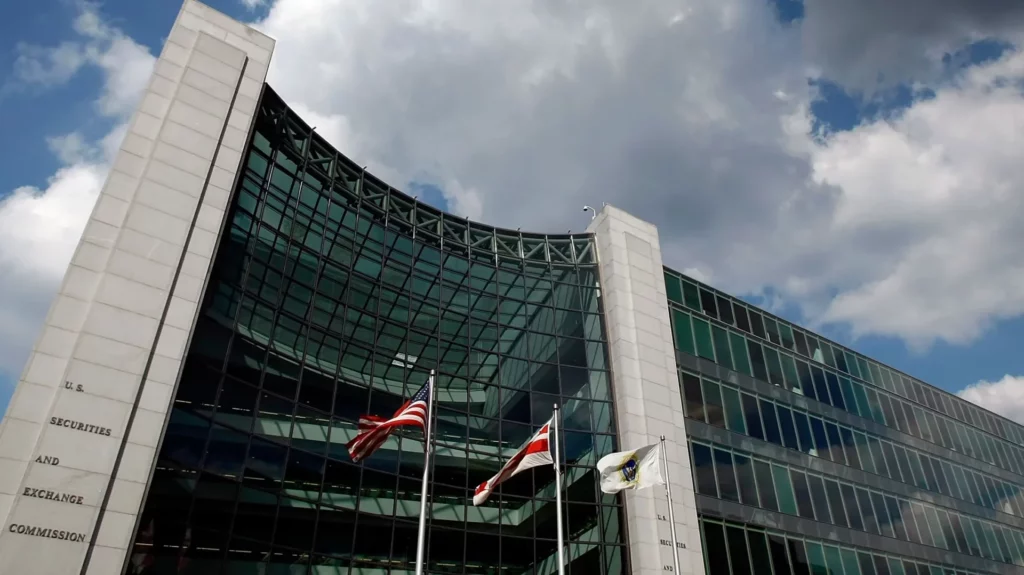SEC Crypto Criminal Enforcement Will Keep Rising Following HyperFund Ponzi Scheme Charges

Ex-SEC trial counsel highlighted the pervasive belief among individuals that investing in the crypto frenzy can fast-track them to financial success. | Credit: Chip Somodevilla/Getty Images
Key Takeaways
- The DOJ and SEC have accused individuals behind HyperFund of scamming investors through a crypto Ponzi scheme.
- The high potential for quick gains in the crypto market makes investors susceptible to fraud.
- Expect more SEC interventions and criminal prosecutions in 2024 within the crypto space.
Recently, the Department of Justice (DOJ) and the Securities and Exchange Commission (SEC) brought forth criminal indictments against several individuals associated with HyperFund.
The charges were for allegedly masterminding a cryptocurrency-based Ponzi scheme valued at $1.9 billion.
Crypto Frenzy Fuels $1.7 Bn Fraud
The perpetrators were accused of deceiving investors by promising significant returns from non-existent cryptocurrency mining ventures through HyperFund.
Arthur Jakoby , former SEC special trial counsel and current partner and co-chair of the Securities Litigation and Enforcement practice at Herrick, Feinstein LLP, highlighted the pervasive belief among many individuals that investing in the cryptocurrency frenzy can fast-track them to financial success.
Jakoby told CCN that this mindset renders them susceptible to fraudulent schemes. The sheer scale of the $1.7 billion fraud is a stark reminder of the risks involved. Jakoby anticipates a significant increase in both SEC interventions and criminal prosecutions related to cryptocurrency dealings in the upcoming year, marking a concerted effort to curb such fraudulent activities in 2024.
He stated:
“The real story here is that there are so many people out there who believe that investing in the cryptocurrency craze will lead to financial nirvana, making them easy marks for fraudsters. The magnitude of this $1.7 billion fraud is stunning.”
Jakoby elaborated further, saying that from a securities perspective, this case represents classic securities fraud. It, according to him, involves an investment of money by investors, who had a reasonable expectation of profits. These profits were purportedly derived from passive daily returns ranging from 0.5% to 1% and from the activities of HyperFund’s crypto asset mining operations.
SEC Declares HyperFund a Ponzi Scheme, Criminal Charges Expected
The operation was a common enterprise—HyperFund—with investors relying on the managerial efforts of others, specifically, the mining team at HyperFund. This scenario fulfills the criteria of the United States Supreme Court’s Howey securities test, classifying the investment as a security.
He added that given the criminal charges in play, it’s improbable that the defendants will contest the SEC’s classification of this operation as a Ponzi scheme. Their focus is more likely to shift towards addressing the criminal charges. They might either present any possible defenses they have or aim to negotiate a settlement in the criminal proceedings.
He asserted:
“Since there are criminal charges here, it is unlikely that the defendants will fight the SEC on this Ponzi scheme and will focus on fighting the criminal charges—to the extent that there is any defense—or settling the criminal charges.”
SEC Alert Foreshadows Crypto Scams, Shaping Legal Landscape
In its 2013 investor alert , the SEC’s Office of Investor Education and Advocacy presciently flagged potential pitfalls within the burgeoning virtual currency market, cautioning investors against the allure of Ponzi schemes and other fraudulent ventures often cloaked in the novelty of cryptocurrencies.
This early advisory underscored the inherent risks and the possibility of manipulation by unscrupulous entities within the cryptocurrency landscape. Over time, the complexity and sophistication of these scams have escalated, compelling regulators to adapt and respond to an evolving array of deceptive practices.
As the legal framework continues to grapple with these challenges in the absence of comprehensive regulation, the outcomes of cryptocurrency-related legal proceedings are increasingly shaping the contours of future regulatory policies and enforcement strategies.

